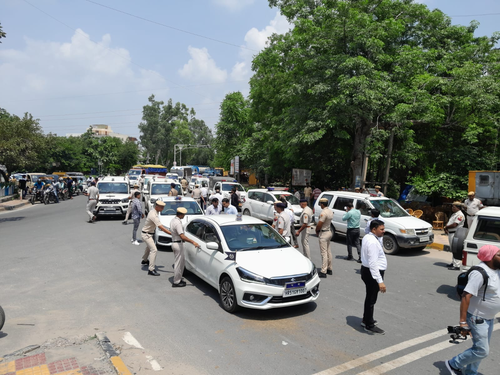New Delhi: The Delhi government has postponed the implementation of the odd-even car rationing scheme as there has been a notable improvement in Delhi’s air quality due to rain, Environment Minister Gopal Rai said Friday.
Addressing a press conference here, he said the government will review the air quality situation after Diwali and a call on the odd-even scheme may be taken if there’s a sharp increase in pollution levels.
Rai had earlier said the scheme will be implemented in the city after the Supreme Court reviews its effectiveness and issues an order.
Tuesday, the apex court questioned the effectiveness of the Delhi government’s car-rationing scheme, aimed at curbing vehicular pollution, and referred to it as “all optics”.
Anticipating further deterioration of the air quality post-Diwali, Rai had Monday announced that the scheme, which permits cars to operate on alternate days based on the odd or even last digit of their registration numbers, would be enforced between November 13 and November 20.
Rai expressed concerns over the negligence in the implementation of the ban on the entry of polluting trucks into Delhi at smaller entry points.
He said the government will write a letter to the Delhi traffic commissioner, urging them to plug the gaps.
Rai said he will also write to the transport ministers of Uttar Pradesh and Haryana, asking them to issue directions to divert trucks carrying non-essential goods on peripheral expressways to avoid traffic jams at the capital’s borders.
Stringent restrictions mandated under the final stage of the Central government’s air pollution control plan for Delhi-NCR called the Graded Response Action Plan (GRAP), were implemented in Delhi starting Sunday (November 5) in view of a sudden dip in air quality.
The restrictions under stage IV of GRAP include a ban on all kinds of construction work and the entry of polluting trucks into the capital.
Under the final stage (Stage IV) of the Graded Response Action Plan, only CNG, electric, and BS VI-compliant vehicles from other states are allowed to enter Delhi, with exemptions granted to those involved in essential services. GRAP categorises actions into four stages: Stage I – ‘Poor’ (AQI 201-300); Stage II – ‘Very Poor’ (AQI 301-400); Stage III – ‘Severe’ (AQI 401-450); and Stage IV – ‘Severe Plus’ (AQI >450).
Intermittent rain led to a rapid improvement in Delhi’s air quality Friday and cleared the suffocating haze that had been lingering for more than 10 days.
At 2 pm, Delhi’s AQI stood at 302 which falls in the “very poor” category. It was 376 at 9 am and 408 at 7 am Friday. The AQI stood at 460 at 11 pm Thursday.
The air quality is expected to improve further due to wind speed favourable for the dispersion of pollutants.
The air quality index (AQI) at any given time is the average of readings taken in the last 24 hours.
The Safdarjung Observatory, Delhi’s primary weather station, recorded 6 mm of rainfall in 24 hours ending 8.30 am Friday and 2.2 mm between 8.30 am and 11.30 am, the India Meteorological Department (IMD) said.
The Met department data showed most of the areas in Delhi recorded light rain.
Kuldeep Srivastava, a senior scientist at the IMD, said most parts of northwest India, including Punjab, Haryana, and western Uttar Pradesh, have recorded rainfall since Thursday night.
The IMD had earlier predicted a marginal improvement in the air quality just ahead of Diwali owing to favourable meteorological conditions, including light rain.
IMD officials had also said a change in the wind direction from northwest to southeast due to a fresh western disturbance affecting northwest India will help reduce the contribution of smoke from stubble burning.
Once the western disturbance passes, the wind speed will increase to around 15 kilometres per hour November 11, which will help disperse pollutants ahead of Diwali (November 12), Srivastava said.
Last year, a decrease in stubble-burning incidents, delayed spells of rain, and an early Diwali along with favourable meteorological conditions prevented the capital from turning into a gas chamber following the festival.
PTI
